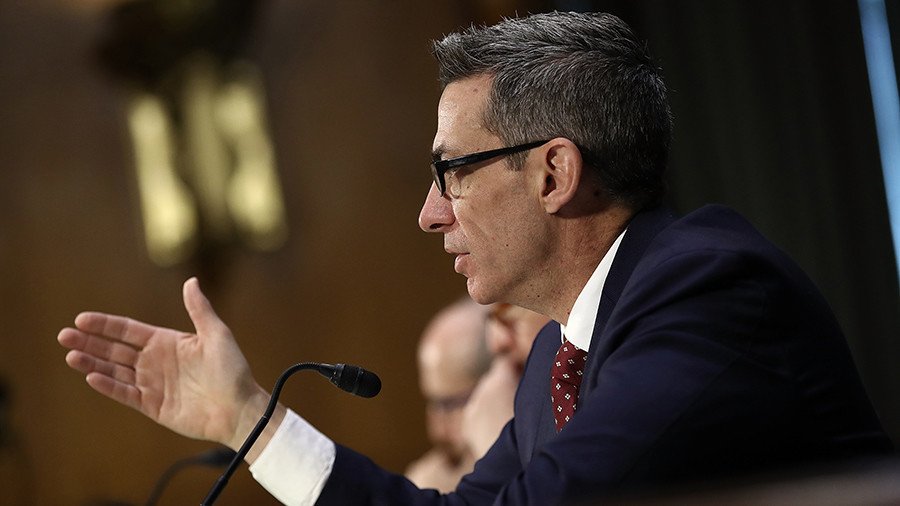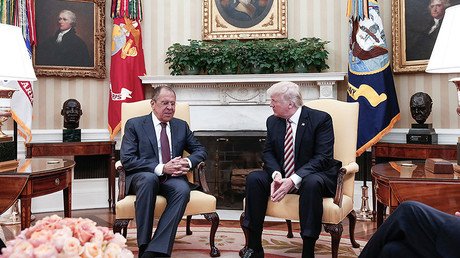Russian influence threatens ‘low-level educated population’ worldwide – Senate witness

Low-educated people worldwide be warned, Kremlin agents are trying to seduce you through social media, says a Washington pundit invited to a Senate hearing about social networks and extremism.
On Wednesday, officials from Facebook, Twitter and YouTube spoke before the Senate Commerce Science and Transportation Committee to explain what the social media platforms were doing to “combat the spread of extremist propaganda” on the internet. Committee chairman, Senator John Thune (R-South Dakota), titled the session, “Is Big Tech doing enough?”
One would imagine, therefore, that the committee’s focus would be on details of policies and practices shared by Facebook’s Monika Bickert, YouTube’s Juniper Downs, or Twitter’s Carlos Monje. Instead, the hearing was dominated by Clint Watts, a serial fabulist who sees “Russian influence” in every tweet, post or video.
1/ RIOT - Russian Influence Ops on Twitter - Data from #Hamilton68https://t.co/qq7gAw3jb5 - Hating on Hillary and Haiti edition pic.twitter.com/A6YTsDrWDa
— (((aweisburd))) (@webradius) January 15, 2018
Given ample time to delve into the “dastardly things” Russia was allegedly doing to undermine America by the committee’s ranking member, Senator Bill Nelson (D-Florida), Watts argued that Russian agents were posting on social media about social issues, in order to create division and polarize the information landscape.
“You see it in Myanmar, or the Philippines… Any low-level educated population around the world, that’s on social media, particularly through mobile applications, is highly vulnerable to this,” he said. “They’ve not built up the ability to assess information or how to avoid being influenced, and so they’re highly vulnerable to this influence technique.”
Rather than backing any particular party or candidate, Russia seeks to break down the lines between fact and fiction and thus create apathy in the electorate, so “you actually cannot keep democracy moving forward,” Watts argued.
Presented at the hearing as a fellow at the Foreign Policy Research Institute, Watts has become more famous than the people behind the Hamilton 68 Dashboard, a project that sees the hand of the Kremlin behind literally every trending topic on social media.
The dashboard is run by the Alliance for Securing Democracy, a project of the German Marshall Fund with an advisory council that reads like a who’s who of Washington establishment politics: from former heads of the CIA and Homeland Security to one-time senior aides to Hillary Clinton and Republican hawk John McCain.
“If you want to know where the Russians are going,” Watts told the senators Wednesday, watch where they set up “state-sponsored outlets” such as RT and Sputnik. “They’re looking very heavily into Latin America.”
RT has just launched a French-language broadcast channel. The Spanish-language RT Actualidad has been operating since 2009.
Watts also claimed that “there’s been no response from the US government with regards to Russian influence campaigns on social media.”
Posing as an expert on Russian “active measures,” Watts speaks no Russian and his scholarship on Russian affairs appears nonexistent. In the words of journalist Max Blumenthal, who published a profile of Watts for Alternet last November, “he is as much an expert on Russian affairs as Harvey Weinstein is a trusted voice on feminism.”
Blumenthal also quoted a speech by Watts to his colleagues at FPRI, in which he spoke of spending 15 years and billions of dollars in counter-terrorism influence operations in the Middle East with “almost no success.”
It appears he finally found a receptive audience, not just among the “Russiagate” twitter conspiracy theorists, but in the US Senate as well.














